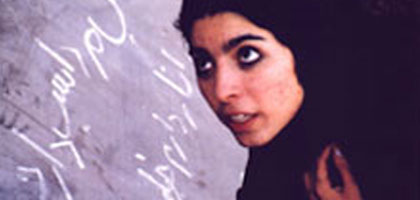
Blackboards
Iran/Italy/Japan 2000

Reviewed by Jonathan Romney
Synopsis
Our synopses give away the plot in full, including surprise twists.
Iranian Kurdistan, near the border with Iraq. A group of itinerant teachers wander in search of pupils. After using their blackboards, which they carry on their backs, to take cover from an army helicopter, the group split up. One teacher, Saïd (Saeed Mohamadi), encounters an old man who asks him to read a letter from his son. Another, Reeboir, (Bahman Ghobadi) meets a party of boys carrying contraband stolen goods to be smuggled across the border; he tries to persuade them to accept him as a teacher.
Saïd joins up with some nomads from Iraq trying to find their way back home. He offers his blackboard as a pallet to carry an ill old man and uses it as dowry to marry the old man's daughter Halaleh, (Behnaz Jafari) a mother with a young son. When one of the young smugglers injures himself, Reeboir chops up his blackboard for a splint. The boys use a herd of goats as camouflage to cross the border, but guards open fire.
The nomads take cover from the gunfire, and despite their distrust, Saïd leads them to the border. Halaleh decides to cross over with them; she and Saïd divorce, and she keeps the blackboard.
Review
When the precocious Iranian director Samira Makhmalbaf - then only 18 - made her debut feature The Apple in 1997, sceptics suspected condescendingly that to some degree it was the work of her father, long-established director Mohsen Makhmalbaf, who did indeed write and edit that film. He has collaborated on Blackboards too, but this film is so different from The Apple and so striking that it can only encourage us to see Samira Makhmalbaf as a very distinctive sensibility, working to develop her own film language with conspicuous success.
Blackboards in one respect echoes the work of Makhmalbaf père, specifically 'The Door', his contribution to the 1999 portmanteau film Tales of Kish. In that sketch, a man walked across a desert carrying a door on his back, a prop which lent itself to multiple metaphoric uses. In Blackboards, Samira Makhmalbaf raises the ante; not only are several blackboard-bearers seen at the beginning, but the object undergoes even more metamorphoses than the door in her father's film.
In the opening shot, as the group of teachers who wander the area in search of pupils appear silhouetted in the stark reddish mountain landscape, they appear like a flock of grounded birds, wings outstretched. Elsewhere in the film, a blackboard variously does service as cover from aircraft, a stretcher, a door and material for splints. In one of the most striking visual images, one board is seen in close-up being plastered for camouflage with the mountain region's muddy clay, and for a moment it seems as if half the screen is being smeared, made to vanish into the red of the landscape, the film's predominant colour.
Whether the blackboards have a more stable meaning as blackboards per se is never entirely clear. The film's central image is of knowledge left abandoned, obliged to try and sell itself in a world that has no place for it. Although the story has the quality of a fairy-tale quest - two teachers rove Iran's border region with Iraq looking for pupils to teach - the overall mood is closer to Kafka.
Written knowledge and language are reduced to scraps, for sale but hardly very useful in this barren, dangerous landscape: the teachers arrive with fragments of other lessons still visible on their boards, which are deformed as their journeys progress. One, Reeboir, begins to teach the smuggler boys the rudiments of language, but they remain mired in phonetic scraps, making absurd "rrrrr!" sounds as they march along. The film portrays a world in which reading and writing may be less use than an oral tradition: a wounded boy assuages his suffering by repeating a story about killing a rabbit. Not that oral communication is very effective, either: both teachers struggle to get any coherent conversation out of the people they encounter. In the end, however, the written word is restored to its communicative power: the phrase "I love you", which the other teacher Saïd has attempted to teach his bride, is, unknown to her, returned to him, as she walks away with the blackboard on her back.
In the pseudo-documentary The Apple, language and institutionalised culture played a redemptive role in the lives of two neglected sisters. Blackboards takes a more tragic view of culture, devalued in a brutal world where everything revolves round survival and the body. Here an old man's being is defined entirely by his inability to piss, and considerable physical effort is required of the cast, who scale mountains and move along dirt roads on hands and knees.
Blackboards is very much a humanist film, but it is less clear whether it is also a political one. The teachers appear to be dispossessed Kurds, and the poverty-stricken border country they travel is spiked with landmines. The prevailing dangers from surveillance helicopters and armed guards are presumably to be taken as Iraqi, but there are no clear signals to suggest they are not also Iranian. The Apple could be considered a benevolent finger wagged at a society that may not always take care of its own; Blackboards, conversely, quite bleakly presents a lawless space in which people risk everything fending for themselves.
Despite considerable comedy, Blackboards seems a profoundly pessimistic film. Both wandering teachers are able to benefit the people they meet, guiding the boys and the nomads to the border. But no one is quite saved at the end: the boys, if they escape the guards' gunfire, will presumably go on plying their perilous trade, and we do not even know if Reeboir survives the attack. As for Saïd, he loses everything - blackboard, bride and the community he has struggled to join. As the tribe walks away in the fog, we hear what sounds like an explosion resounding under the final song - a devastating minor-key payoff to this extraordinary odyssey.
Credits
- Director
- Samira Makhmalbaf
- Screenplay
- Samira Makhmalbaf
- Mohsen Makhmalbaf
- Director of Photography
- Ebrahim Ghafouri
- Editor
- Mohsen Makhmalbaf
- Music
- Mohammad-Reza Darvishi
